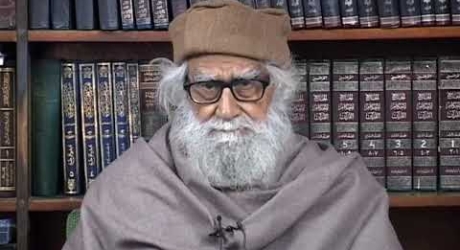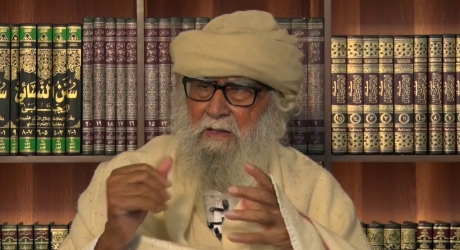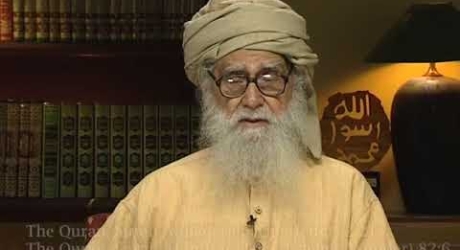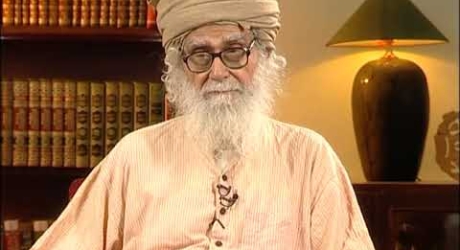There are 114 Chapters in the Quran. Chapter 103 speaks of an important aspect of human life. The translation of this Chapter is as follows: “Time is a witness that man is in loss, except for those who believe and do good deeds and exhort one another to hold fast to the truth, and who exhort one another to steadfastness.”
Here, “time” refers to human history. This Quranic verse gives a picture of the whole of human history. The verse was revealed in the first quarter of the seventh century, that is, the period before the modern-day civilization. More than one thousand years before this development the Quran gave a sweeping remark that man has been in loss throughout human history. It is very strange that this statement proved to be true. Even the modern developed world is not an exception to this experience.
Loss, mentioned here, is not meant in the sense of physical loss, but in the sense of a feeling of loss. It is a historical experience that every person—rich or poor—does not find fulfilment in spite of achieving all worldly gains.
Why does one have this feeling of loss? It is because man, by nature, has unlimited desires but the achievable things in this world are limited. It is this gap between his desires and achievable things of the world that develops a feeling of loss. But this phenomenon is not an evil, it is rather a great blessing.
There are 114 chapters in the Quran. Chapter 103 is al-Asr (The Passage of Time). It is a small chapter. However, there are many important things said about this chapter in traditions. For example, Imam Shafii said: “If people ponder over this chapter, then that would suffice for them.” Similarly, Ibn Kathir narrates from Tabarani that whenever two of the Companions of the Prophet met, before leaving each other they would recite Chapter al-Asr to each other and then depart.
The first verse of the Chapter al-Asr is: “I swear by the passage of time that man is surely in a state of loss.” (103:1-2) I used to often think what the importance of this chapter is. I couldn’t find any clear answer to this in the commentaries of the Quran.
In the statement ‘Time is a witness that man is in loss’, “time” means human history. That is, human history is a witness that man is in loss. I used to think about the meaning of this verse. I learnt of its meaning through an observation. I listen to AIR daily. I realized that every person speaks negatively of himself, they do not give good news about themselves, rather only news of despair. I thought about this phenomenon. Then, I realized that to think about loss rather than gain is a realistic way of thinking. Because, actually man has experience of loss in life. Man’s desires want him to have experience of gain, however, in real life he experiences loss. So, why did the Companions give importance to this way of thinking, that is, thinking of the losses of one’s life and not the gains? There is great wisdom behind this. If you think about gain, you will develop pride, superiority complex and arrogance, which are worst qualities for a person. But, if you think about losses of your life, you will develop modesty and humility, which are very important virtues. This develops in you a realistic way of thinking.
If you think of loss, you also develop Hereafter-oriented thinking. You realize that the Paradise you are in search of cannot be attained in this world, it can only be had in the Hereafter. Throughout history man has always thought by taking only the present into consideration. That is, people always have believed in the concept of ‘right here, right now’.
Yesterday a person from Bombay told me that he happened to go to a gathering of top superstars. These superstars had not put up makeup as it was an informal meeting. The person told me that he observed every superstar’s face closely and couldn’t find any trace of happiness. This is the case of entire human history. Man is in loss. This doesn’t mean that one doesn’t get food to eat or clothes to wear. Rather, it means that man is unable to get what he truly years for. Here, “loss” means man did not get what he wanted.
If we read the lives of people in biographies, we see that the beginning of people’s lives is with great enthusiasm and zeal. However, in one’s end days one dies in despair and frustration. For example, Bertrand Russell writes in his autobiography toward the end that in the final days of his life he was facing the question what the purpose of life is.
This phenomenon of man is not simple. Man is born with great desires and ambitions, however he doesn’t attain fulfilment and satisfaction. This phenomenon is actually a great mercy of God. This is not an evil of history. God made man’s nature such that he does not attain fulfilment and peace of mind in this world. Thus, as a result, he is compelled to think and reflect over this situation. When man faces loss and goes through a negative experience, he always thinks ‘where he missed the bus?’ This is human nature. Man always thinks what went wrong. This is a great blessing of God that man can think in this manner. Had he attained fulfilment and peace of mind in this world, he would have never thought or pondered over the realities of life, rather he would have continued to live with the concept of right here, right now.
Thus, the above verse which says that man is in loss, is actually mention of a mercy or blessing of God. Rather, it is the greatest mercy of God for man. This way of thinking made the verse very positive for me, although apparently it was negatively worded. Once a father earned a lot of money throughout his life and spent it all toward the end. People asked him why he didn’t save the money for his children. He said if his children received free money, they would remain stagnant and wouldn’t do anything. But, if they don’t get anything they would think and work for themselves. So, when you do not get something you think, or you become awakened.
If a person is born without anything, then he is born with something great and that is incentive. If man doesn’t have anything in inheritance then he strains himself to do something. Thus, similarly, the above verse tells us that because man doesn’t get what he wants in life, he begins to think deeply and discovers a great reality of life, that is, Paradise.
My case has been same. I tried to get into various kinds of businesses and job, but I failed every time. My elder brother helped me in various ways so that I could set up a business. However, I failed in every such endeavour. This is what made me a seeker. Had I been successful in these jobs, I would have never become a seeker after truth. This failure of mine turned me into a seeker and subsequently I reached the truth. I then wrote the book Islam Rediscovered. Behind this book is a story of failure.
Thus, the verse “History is a witness that man is in loss”, actually means that history is a witness that God has bestowed His great blessing on man. Man’s ambitions and desires remain unfulfilled and thus he becomes modest. Otherwise, man would have become arrogant. God set an example of this in the beginning of human life. When Adam was born he immediately got Paradise. He had everything, however, he went against God’s commandment. Thus, it shows that when man gets everything, he tends to deviate or become proud. Had this been the case with man in general, then all would have turned arrogant. Therefore, the above verse doesn’t speak of any negative aspect of history or creation, rather it speaks of a positive aspect of creation. That is, man doesn’t get true happiness even if he attains everything.
I once went to Bombay where I lived with a wealthy man. We used to sleep in the same room together. Once I observed after waking up from my sleep that he was awake on his bed. When I asked why, he said that he does not get sleep. Then, where is happiness if man cannot sleep in spite of having every material thing. Once I went to the godown of a businessman. There we saw a labourer in deep sleep. The owner of the godown told me that he never gets this kind of sleep even on a comfortable mattress. This shows that despite all his wealth and richness, that man was not happy. Then, in another incident I met a businessman who had two sons. One of his sons did love marriage and was living in a farmhouse. I visited their house many years after marriage, and observed that the husband and wife were not even speaking to each other. There was no happiness in spite of the two marrying whom they had initially insisted on marrying. This is the case of entire human history. Once I went to the mansion of a Muslim prince. They had held a meeting of the ulema, to which I was also invited. I saw that the prince was seated on a very comfortable mattress. But, he was seen continuously cleaning his nose with a box of tissue paper kept adjacent to him. All the comfort in which he was living was meaningless as he was constantly troubled by the cold he contracted.
Thus, negative experience is of greater importance in life than positive experience. Because, positive experience always develops in a person pride and superiority complex. This is a killer psychology. However, when you face negative experience and losses, then you are cut-to-size. This is the greatest thing for a man, as this brings in deep thinking in a person. Most importantly, he thinks that he did not get what he wanted in this world, then where else is it? I was once thinking that God gave me a mind, but to spend its capacity the requisite environment is not available here. I have eyes but the scene that I want to see I cannot see in this world. Once I was listening to the radio and I heard the song of a woman who is considered nightingale. This made me think where the world is where my ears can enjoy the songs I want to truly hear. Man always gets less than what he desires.
I thought God gave me a mind but not the environment to think, ears but not the songs that I want to hear, eyes but not the scenes to behold. Then where is that world where I get satisfaction? That world is Paradise. To make man realize this fact, God created such environment that man experiences loss and not gain.
According to a Hadith, if God loves a person He makes him experience loss and hardship. (Musnad Ahmad) This is because God wants him to focus on the eternal life and become disinterested in the present temporary world. God wants to take man to eternity that is why he makes him experience loss. This is the reason why God created man is hardship. The Quran says: “We created man into a life of toil and trial.” (90:4)
This shows that the greatest success for man is to experience failure in this world. God has created life such that we will surely experience loss and not gain. This shows that this is the plan of God for man. There is wisdom behind this and that wisdom is to make man think about Hereafter instead of the present world. This is a great blessing of God. Had God not done this, entire human history would have passed without man realizing the truth and without discovering Paradise and Hereafter.
Loss is part of the creation plan of God, and it is spread over entire human history. This is a great mercy of God as this phenomenon prevents man from deviating from the truth. Otherwise, there would have been no one to have walked the path of truth.
Another lesson in this phenomenon is that when you experience loss, you shouldn’t think of loss, rather think of all that you still possess. Do you still have food to eat and clothes to wear? If yes, then you should thank God. People generally lose a very small thing and have everything else intact. They should therefore not focus on what is lost, but what they still have. Thus, this verse of the Quran has great wisdom in it.
Muslims complain today of conspiracies, losses and other things. But, they still have a lot: they have food to eat and clothes to dress themselves. Then they should forget the loss. Loss is part of the creation plan of God. This would save you from negativity. This is a great message in this small chapter of the Quran.
The Companions were very conscious about what they should think of, that is why they gave so much importance to the Chapter al-Asr from the Quran.
Questions and Answers
Q1. What is the difference between jazbatiyat and kaifiyat?
A1. Kaifiyat is necessary. Jazbatiyat is something else. Rabbani kaifiyat brings love of God and fear of God in a person and makes one think of accountability at every instance. While, jazbatiyat, on the other hand, is mere emotions.
Q2. What is asri uslub or contemporary idiom?
A2. This means to speak in the language that addresses the modern mind. For example, according to a Hadith the Prophet used to remember God at every occasion. (Musnad Ahmad) The traditional explanation of this Hadith is that the Prophet used to often repeat words like Alhamdulillah and subhanallah. This explanation has no rational logic in it. To explain it to the present mind, I say that the Prophet used to make every occasion a point of reference to remember God. For example, if I pick up a glass of water and it slips from my hand, then I remember the power and might of God, who is controlling the entire universe with perfection. This makes me realize my humility in comparison to God. This explanation has rational logic in it.
Q3. Is it right to think that those who fought in Battle of Camel and Battle of Siffin were jannati or will go to Paradise?
A3. Actions depend upon intention. (Bukhari). Once a person asked Maulana Madani whether Jinnah’s end would be good or bad. Then, Maulana Madani thought for a while and said if his intentions were right his end would be right, but if his intentions were wrong, his end too would be wrong.
Q4. What is the solution to the turmoil in Central Asia?
A4. Dawah work brings positive thinking and well-wishing for all. This leads to positivity, sympathy and peaceful thinking in oneself and others. This would solve the problem. This is a long-term solution and in this regard such a solution can only work. Our mission is not a political mission, it is a dawah mission. And this is only the solution to all problems.
Q5. How to know whether dawah done by me is acceptable to God?
A5. Dawah should be done as a responsibility. The Companions of the Prophet did not know whether their actions or worship would be acceptable to God. Caliph Umar’s son said to him, when he neared the stage of death, that he has great position as he did great works for Islam. Umar said: ‘Abdullah do not deceive me. I just want that in the Hereafter there is nothing goes in favour of me and nothing goes against me.’ Thus, we should do work for God as a responsibility and not think of other things.
Q6. How to develop art of thinking?
A6. Anti-self thinking is the way. A Hadith says that a believer is like a mirror for the other believer. (Abu Dawud) A mirror exactly shows you the spots you have on your face, it doesn’t show anything wrong. A true believer becomes a mirror for the other believer. So we should introspect about ourselves and accept our mistakes when pointed out by others.
Q7. What is the role of silence when one is angry? Does silence weaken a person and makes the other person stronger?
A7. When you are angry, you should only think of how to end your negativity. You shouldn’t think of the other. The Quran enjoins patience at various places for the same reason. One should think of oneself. A Hadith says: You are responsible for yourself. (Tirmidhi)
Q8. How to create interest in non-Muslims for dawah?
A8. We should pray for others. Dawah has to be done along with dua, or prayer.
Dua will not be effective if we do not do dawah.
Q9. Can frustration be over when we discover the truth?
A9. If we discover the truth and creation plan of God, we will learn that we will face loss. If people think that they should keep getting everything then they will be frustrated. But if they realize the truth, that is, they cannot get everything in this world then surely they will become peaceful
Q10. What should one think when one faces loss, that God has a better plan?
A10. I remember the saying of Hazrat Ali in such situations: “What happened, happened for your betterment.” This brings positive thinking in you. That is, the direction of your thought changes from negativity to positivity.










